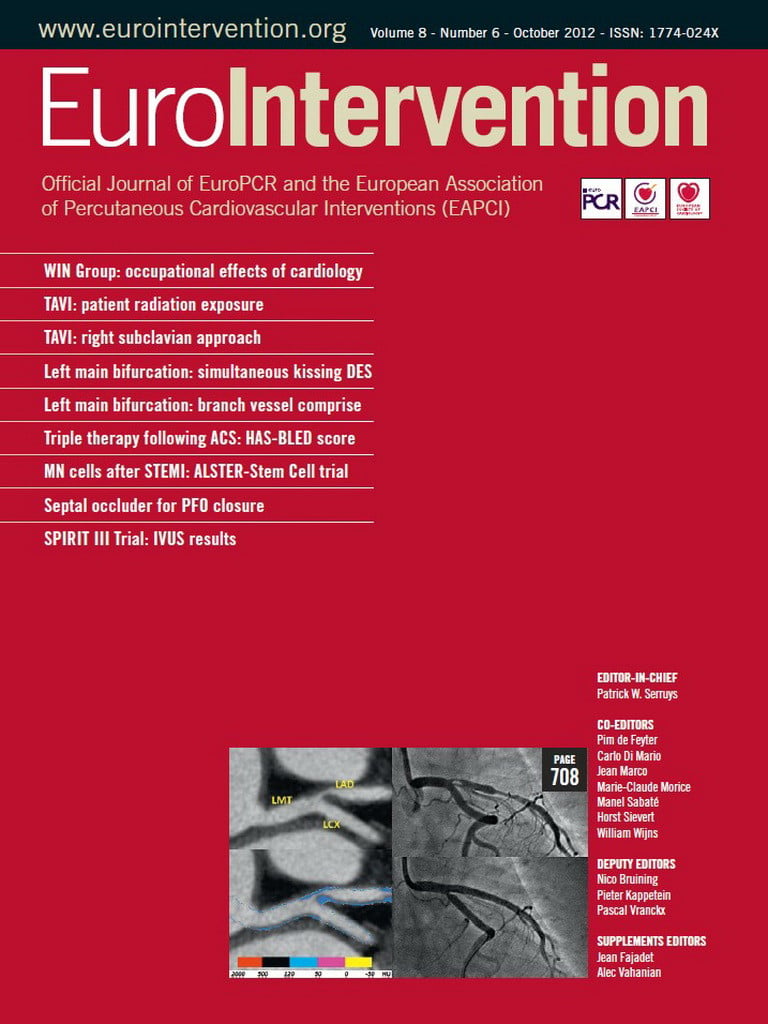Effective control of blood pressure levels in hypertensive patients is associated with a reduction in cardiovascular mortality as well as in the incidence of stroke, myocardial infarction and renal events. Yet, despite the use of combinations of antihypertensive drugs, blood pressure control cannot be obtained in a large proportion of patients. In order to provide resistant hypertensive patients with optimal care, a holistic team approach for the decision-making process and appropriate use of therapies and techniques is crucial.
Just a few years ago the idea of catheter-based renal sympathetic denervation was something in the mind of research clinicians; today, while it is still at a formative stage in its development and use, it is increasingly being spoken about.
The growing interest in catheter-based renal sympathetic denervation and other technologies was underlined during the Great Debate “The interventional treatment of resistant hypertension”, at last May’s EuroPCR course in Paris. This exciting discussion was continued in front of a full room at the European Society of Cardiology’s meeting in Munich last August making it clear that additional attention to renal sympathetic denervation was called for in the future. The ESC debate was led by Isabelle Durand-Zaleski and William Wijns, in collaboration with the EAPCI and EuroPCR. The speakers included Felix Mahfoud, William McKane, Pierre-François Plouin, Jean Renkin, Luis Miguel Ruilope and Tomas Zeller discussing the “current role of interventional renal denervation in the treatment of severe hypertension”.
While the physiological rationale of this minimally invasive, catheter-based technique is new and challenging, it has demonstrated its potential in the treatment of hypertension. And while, at present, its use is limited to patients presenting with resistant hypertension on at least three major hypertensive agents –and data is limited– the treatment and results are promising. Subsequently, interest on the part of interventional cardiologists is growing as this represents a whole new sphere of activity for our clinical practice; and our industry partners have followed suit, committing themselves to explore this technique as well.
With the increasing buzz surrounding renal denervation, the EAPCI along with our partners asked what would be the ideal elements that allow for advances in our understanding and eventual use of this procedure, as well as to ensure a successful integration of promising new technologies into their armamentarium?
As we have learned in TAVI, we believe we have a historic imperative to develop and promulgate new clinical procedures in a collaborative rather than divisive fashion. Our intention is thus to build on the successful and now fully accepted practice of the Heart Team with its multidisciplinary approach –so essential in the TAVI process– to create the concept of the TAVI process. To do this we propose the similar concept of the “Hypertension Team” and we will construct a course entitled, “Novel approaches for the management of a patient presenting with resistant hypertension”. This course will call on the participation of not only interventional cardiologists, but hypertension specialists, physicians caring for hypertensive patients, physicians performing catheter-based interventional medicine and other healthcare providers to reflect the current state of knowledge in this field. The course will also offer us, as well, the occasion to share our acquired experience. This first Resistant Hypertension Course is a joint initiative of the European Society of Hypertension (ESH), the European Association of Percutaneous Cardiovascular Intervention (EAPCI) and PCR.
It is only fitting that the EAPCI together with the ESH has announced this new course dedicated to the treatment of resistant hypertension during the recent PCR London Valves, because, as we all know, transcatheter valve implantation was itself considered rare and revolutionary only a short time ago and has grown with the concept of the Heart Team approach.
It is clear, and we emphasise this often, that the advancement of our knowledge and technique requires that we engage with those practitioners who have the greatest experience in the field we are investigating. We must then effectively transfer that knowledge, experience, education and information to our members as well as to the future participants of the courses we develop and offer. In doing this, we can ensure the highest quality in this new adventure in education and information.
There is still much work to be done. Research continues and we are in need of new standardised definitions, new trials and long-term data. Specialists need to be informed and educated. Selection of patients and the understanding of the limits and impact of renal denervation must be fully considered, but I believe that this is the start of a new avenue in treating our patients and the EAPCI and myself, –along with our partners– are committed to this new course.
We look forward to you joining us, the EAPCI, European Society of Hypertension and PCR on the 15-16 February 2013 in Berlin, Germany, for this future –and very exciting– resistant hypertension course.

